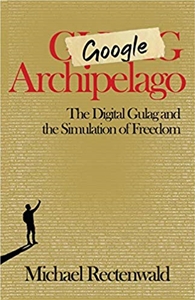Jason Morgan reviews Michael Rectenwald’s new book Google Archipelago: The Digital Gulag and the Simulation of Freedom:
The near-homogeneity of Silicon Valley political beliefs has gone from wry punchline to national crisis in the United States. The monoculture of virtue signaling and high- and heavy-handed woke corporate leftism at places like Google, Twitter, and Facebook was once a source of chagrin for those who found themselves shut out of various internet sites for deviating from the orthodoxies of the Palo Alto elites. After the 2016 presidential election, however, it became obvious that the digitalistas were doing a lot more than just making examples of a few handpicked “extremists.” From the shadow banning of non-leftist sites and views to full-complement political propagandizing, Bay Area leftists have been so aggressive in bending the national psyche to their will that there is talk in the papers and on the cable “news” channels of “existential threats to our democracy.”
It is tempting to see this as a function of political correctness. Americans, and others around the world, who have found themselves on the “wrong side of history” (as determined by the cultural elite in an endless cycle of epistemological door closing) have long been shut out of conversations, their views deemed beyond the pale of acceptable discourse in enlightened modern societies. Google, Facebook, Twitter — are these corporations, and their uber-woke CEOs, just cranking the PC up to eleven and imposing their schoolmarmish proclivities on the billions of people who want to scrawl messages on their electronic chalkboards?
Not so, says reformed leftist — and current PC target — Michael Rectenwald. The truth of Stanford and Harvard alumni’s death grip on global discourse is much more complicated than just PC run amok. It is not that the Silicon Valley giants are agents of mass surveillance and censorship (although mass surveillance and censorship are precisely the business they’re in). It’s that the very system they have designed is, structurally, the same as the systems of oppression that blanketed and smothered free expression in so much of the world during the previous century. In his latest book, Google Archipelago, Rectenwald outlines how this system works, why leftism is synonymous with oppression, and how the Google Archipelago’s regime of “simulated reality” “must be countered, not only with real knowledge, but with a metaphysics of truth.”
Google Archipelago is divided into eight chapters and is rooted in both Rectenwald’s encyclopedic knowledge of the history of science and corporate control of culture, as well as in his own experiences. Before retiring, Rectenwald had been a professor at New York University, where he was thoroughly entrenched in the PC episteme that squelches real thought at universities across North America and beyond. Gradually, Rectenwald began to realize that PC was not a philosophy, but the enemy of open inquiry. For this reason, and because Rectenwald is an expert in the so-called digital humanities and the long history of scientific (and pseudo-scientific) thinking that feeds into it, Google Archipelago is not just a dry monograph about a social issue. By turns memoir, Kafkaesque dream sequence, trenchant rebuke of leftist censorship, and intellectual history of woke corporate political correctness, Google Archipelago is a welcoming window into a mind working happily in overdrive.



 The 9-4 Vikings headed to the west coast for a game against the
The 9-4 Vikings headed to the west coast for a game against the 




